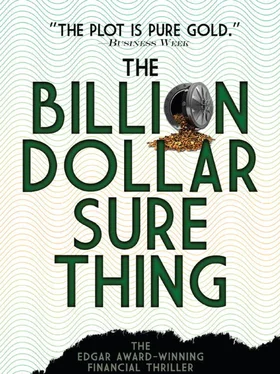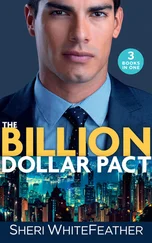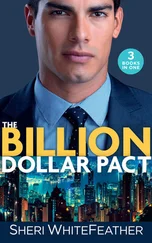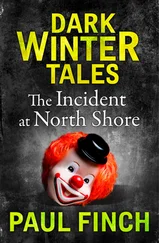Paul Erdman - The Billion Dollar Sure Thing
Здесь есть возможность читать онлайн «Paul Erdman - The Billion Dollar Sure Thing» весь текст электронной книги совершенно бесплатно (целиком полную версию без сокращений). В некоторых случаях можно слушать аудио, скачать через торрент в формате fb2 и присутствует краткое содержание. Город: Mineola, Год выпуска: 2018, ISBN: 2018, Издательство: Dover Publications, Inc., Жанр: Триллер, на английском языке. Описание произведения, (предисловие) а так же отзывы посетителей доступны на портале библиотеки ЛибКат.
- Название:The Billion Dollar Sure Thing
- Автор:
- Издательство:Dover Publications, Inc.
- Жанр:
- Год:2018
- Город:Mineola
- ISBN:978-0-48682-811-4
- Рейтинг книги:3 / 5. Голосов: 1
-
Избранное:Добавить в избранное
- Отзывы:
-
Ваша оценка:
- 60
- 1
- 2
- 3
- 4
- 5
The Billion Dollar Sure Thing: краткое содержание, описание и аннотация
Предлагаем к чтению аннотацию, описание, краткое содержание или предисловие (зависит от того, что написал сам автор книги «The Billion Dollar Sure Thing»). Если вы не нашли необходимую информацию о книге — напишите в комментариях, мы постараемся отыскать её.
Paul Erdman’s fast-paced, suspenseful story centers on a billion-dollar, top-secret coup intended to protect the U.S. dollar. In settings that range from Washington, D.C., to London, Paris, Moscow, and Beirut, a cast of memorable characters enact a plot that brings the world to the brink of the biggest financial explosion in history.
The Billion Dollar Sure Thing — читать онлайн бесплатно полную книгу (весь текст) целиком
Ниже представлен текст книги, разбитый по страницам. Система сохранения места последней прочитанной страницы, позволяет с удобством читать онлайн бесплатно книгу «The Billion Dollar Sure Thing», без необходимости каждый раз заново искать на чём Вы остановились. Поставьте закладку, и сможете в любой момент перейти на страницу, на которой закончили чтение.
Интервал:
Закладка:
“Now Igor, who started this whole Eurodollar merry-go-round in the first place, anyway? I should be asking the questions, not you.”
The girl arrived with two trays. Both bankers attacked their somewhat overdone steaks with gusto. No sooner had they finished than the coffee was served. Both helped themselves to cognac. Neither apparently had any desire to talk shop any longer, and the conversation had drifted back to the late 1930s: to mutual friends, Chamberlain, pubs.
During disembarkation Bollinger extended an invitation to Melekov to drop over to Basel for lunch, if he had time. Melekov declined with thanks. He only planned to be in Switzerland for one day. But he did mention that he would greatly appreciate any courtesy which Bollinger might extend to his colleagues and their 20 million ounces of gold. They agreed to keep in touch.
Bollinger had to hurry to make his connecting flight to Basel. Melekov proceeded through the labyrinth, and after unusual formalities at the immigration desk—they take Russians seriously in Zurich—was met and duly escorted to the waiting car by a reception committee of three. He was back in the fold of the Soviet collective.
At nine-twenty-five the next morning Melekov boarded Aeroflot flight 61—nonstop to Moscow.
5
TWO days later, on October 20, Stanley Rosen landed in Beirut, coming from New York via Paris. He looked beat. He also looked a bit wary. This was the first time he had ever ventured into Arab territory. Sure, he was quite aware of the fact that Lebanon was not strictly Arab in that sense. Nevertheless, there was no doubt about a certain tightness in his stomach which had nothing to do with the usual effects of long-distance air travel.
For some reason the plane had been waved off on its first approach from the sea and had had to make a very wide lazy circle, high over Lebanon, before landing. Rosen had been amazed, and even shocked, when the captain had pointed out that Damascus could be seen as a small spot on the horizon in the flatlands behind the mountains against which Beirut snuggled. So close to the lion’s den.
Rosen was, of course, Jewish. But a very watered-down American version. After his childhood in New Jersey he had had absolutely no connection with his ancestral religion. This was not deliberate: it was just so. When he was in New York, it was seldom that he ever gave any thought to his origins. But in Europe, on every trip his consciousness of the fact was somehow refreshed. He was never reminded in a really nasty sense. But reminded just the same.
The facilities at the airport were no great shakes, and it seemed to take ages before he had cleared customs. Outside the building he immediately found a cab, American-size, and after a thirty-minute ride through what seemed to be a surprisingly European city, he arrived at the Phoenicia. Except for the Arab getup of the doorman, he could have been in Miami Beach. While he was waiting for the check-in formalities to be completed, he was served a cup of Turkish coffee right from the brass urn, or whatever it was called. Phony, but interesting. He hated this kind of coffee, but when in…
His room was strictly non-Arab. The menu featured hamburgers along with shashlik. The bellhop was all smiles. The maid was dark but cute. Stanley was slowly regaining his equilibrium.
It may seem strange that a man worth at least $20 million could ever lose his equilibrium in this world of the 1970s. But though quite aware of the safety and protection which money assured, Stanley Rosen was equally sensitive to the fact that he had earned it quickly. And although he had earned it on Wall Street, it had been on the wrong side of that narrow street. He was known as one of the cleverest financial operators in New York; he was a regular for lunch downstairs at the “21” Club; his phone calls were usually accepted without hesitation. But he had never seen the inside of the New York Athletic Club, and he had never been asked upstairs to lunch at Lehman Brothers. Yet it was known that he managed over $1 billion in assets. Some people put the figure appreciably higher.
The success of Stanley Rosen lay in the fact that he was endowed with a mental adeptness of almost unique character. Furthermore, he was willing to apply his mind to everything—literally everything—that had to do with money, its management, its use to make still more money.
But he never gambled.
During the days of the great bull market in the mid-1960s Rosen did not plunge into new hot issues with his clients’ funds. He specialized in merger arbitrage and was satisfied with a more or less 20 percent return per annum. He deliberately rejected opportunities for doubling his money through access to a block of shares of sure-fire new companies. In those days of euphoria, instead of using margin facilities, he kept at least 25 percent of his funds in certificates of deposit and Treasury bills, and as the Dow Jones Industrial climbed toward 1000 steadily, he increased the cash or near cash components of the portfolios he managed. He was one of the first to detect that one could get a substantially higher return in dollars by lending them out in Europe for periods of three to twelve months (less one day—for tax reasons), against essentially no risk whatsoever, for the borrowers were the largest financial institutions in the world. And there was where he had most of the funds he managed, while the New York Stock Exchange was dropping week after week and month after month in the grim days of 1969 and early 1970. In mid-1970 Rosen had massively switched continents once more, putting almost everything back into New York: T-bills, Fannie Mae, and blue chips. By early 1971 he was back in Europe. This time he concentrated on German chemical company stocks and shares of the Big Four Swiss Banks. He stayed there quite a while and made another pile in the process. Then he moved to Tokyo and made still another. Rosen knew how to consistently make money in both bull and bear markets. Obviously a good man to know.
When people first met Stanley, they found all this most difficult to appreciate. He was short and fairly tubby. His clothes hung. His shoes were rarely polished. A blue tie and a green shirt were not unusual. He spoke rapidly, most indistinctly, and with a truly atrocious New York accent. When riding with him from Wall Street to midtown, more than one of his new clients had the thought that Stanley would have much more aptly fitted behind the wheel of the limousine than in the back seat.
There was another feature of Stanley which one could not overlook. He liked girls—lots of them. And the damndest thing was that girls really liked Stanley, with or without limousine, with or without the “21.” It never failed to astound his associates when Stanley inevitably ended up with the real stunner at a party, whether in Beverly Hills, the Bahamas, or Greenwich Village.
Rosen did not fool around with small clients. The minimum portfolio he would take on was $5 million. He never solicited clients, and in fact he had not taken on any new unsolicited ones during the past four years. Who needed them?
More than a few people in both New York and Washington wondered who his clientele were—in fact, more than just wondered. Stanley knew this quite well, and therefore he ran his New York shop in a fashion which was impeccable—a model of accounting practices, up-to-dateness, orderliness, supervised with ultra-scrupulous attention to all laws of the land. No, Stanley did not run The Vatican’s money. The blunt fact was that Rosen handled the funds of a group of gentlemen who ranked among the most successful businessmen of the twentieth century—in Las Vegas, Miami, Chicago, Boston, New Jersey. All of them had backgrounds as humble as that of Stanley himself. All of them had accumulated immense liquid wealth since World War II. But none of them had direct access to the legitimate money and capital markets of the world or to the reputable money managers of the world—be they the trust departments of banks, the big-name investment houses in New York, or the la-di-da private counselors in Boston. So you see, there are also disadvantages in being in the Mafia. Not many of course, but still…
Читать дальшеИнтервал:
Закладка:
Похожие книги на «The Billion Dollar Sure Thing»
Представляем Вашему вниманию похожие книги на «The Billion Dollar Sure Thing» списком для выбора. Мы отобрали схожую по названию и смыслу литературу в надежде предоставить читателям больше вариантов отыскать новые, интересные, ещё непрочитанные произведения.
Обсуждение, отзывы о книге «The Billion Dollar Sure Thing» и просто собственные мнения читателей. Оставьте ваши комментарии, напишите, что Вы думаете о произведении, его смысле или главных героях. Укажите что конкретно понравилось, а что нет, и почему Вы так считаете.












